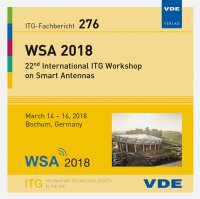Influence of Channel Parameters on Noncoherent Massive MIMO Systems
Konferenz: WSA 2018 - 22nd International ITG Workshop on Smart Antennas
14.03.2018 - 16.03.2018 in Bochum, Deutschland
Tagungsband: WSA 2018
Seiten: 7Sprache: EnglischTyp: PDF
Persönliche VDE-Mitglieder erhalten auf diesen Artikel 10% Rabatt
Autoren:
Bucher, Stephan; Waldschmidt, Christian (Institute of Microwave Engineering, Ulm University, 89081 Ulm, Germany)
Yammine, George; Fischer, Robert F. H. (Institute of Communications Engineering, Ulm University, 89081 Ulm, Germany)
Inhalt:
In multi-user massive MIMO uplink systems, noncoherent detection schemes offer an appealing alternative to classical coherent detection algorithms. Sorted decision-feedback differential detection (DFDD) in combination with noncoherent decision-feedback equalization (nDFE) over the users have been demonstrated to achieve comparable results to the coherent case. Up to now, the assessment of noncoherent detection has been performed on the basis of an idealized channel model. In this paper, the influence of channel parameters on the performance of noncoherent massive MIMO systems is analyzed via an extensive simulation study. Thereby, a realistic channel model, in particular the COST 2100 channel model, forms the basis for the evaluation. It is shown that performance is highly dependent on the actual channel settings as well as on the power control of the transmitter. A further outcome is that the idealized channel model in previous studies ignores correlation effects and exhibits other power distributions among the receiving antennas. As a consequence, further optimization steps for noncoherent detection are required.


